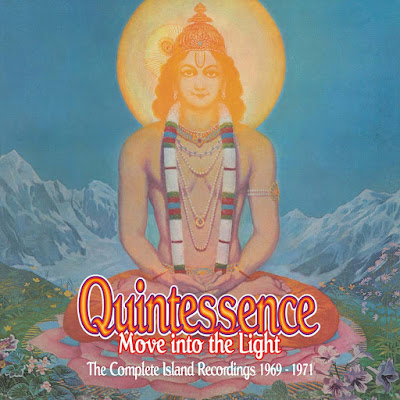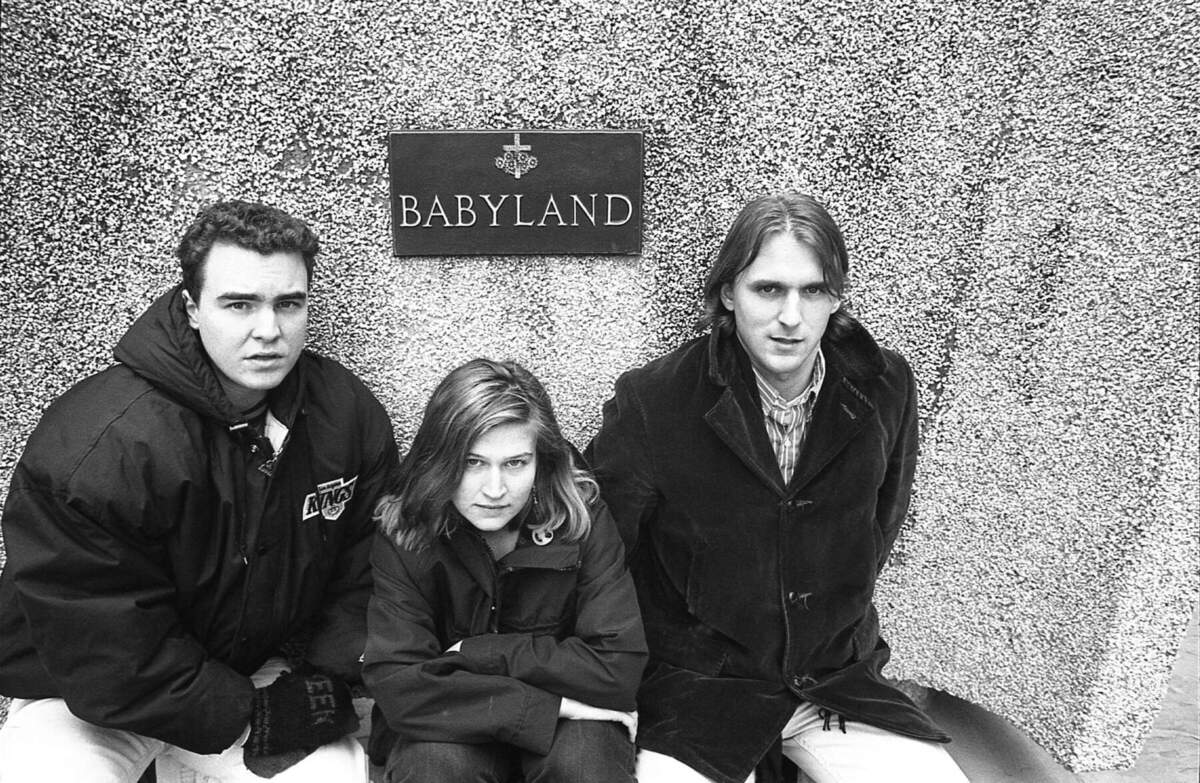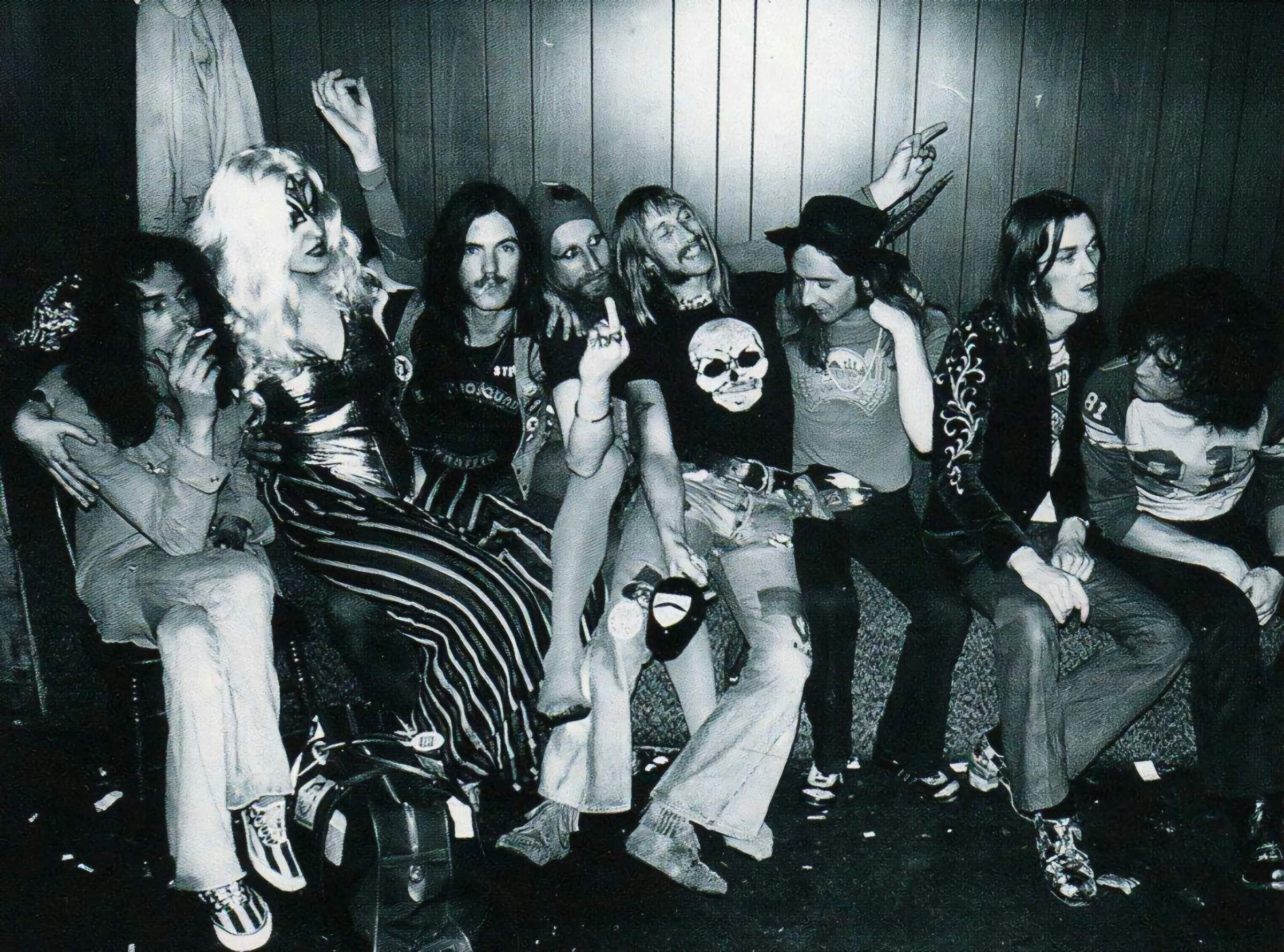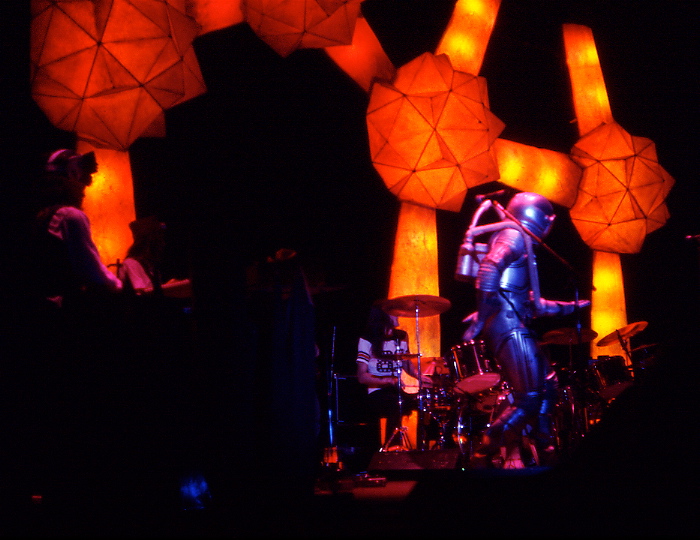Quintessence – “Move into the Light” (2017) review
Quintessence – Move into the Light: The Complete Island Recordings 1969-1971 (Esoteric Recordings, ELEC 22554, 28 April 2017)
After only a handful of gigs, Eastern-influenced UK psychedelic rock band, Quintessence received two recording contract offers. In the end, the band rejected Ian Samwell’s offer from Reprise Records (despite it being more lucrative) in favor of one from Chris Blackwell of Island Records, the decision based on the amount of artistic control granted to the band. The agreement resulted in the three LPs and one single that comprise Move into the Light.
Quintessence took its name from a suggestion by Australian flutist Ron “Raja Ram” Rothfield, despite the band having six members rather than five. The Eastern influence on the band is reflected in the names such as “Shiva Shankar” and “Maha Dev” as well as the previously mentioned “Raja Ram,” which the band members were christened with by Swami Ambikamanda, the band’s spiritual guide.
The band’s debut LP In Blissful Company was produced by John Barham who had worked with George Harrison on “Wonderwall Music” and would later help with “All Things Must Pass,” rather than by Andy Johns as originally scheduled. It may not have been Island’s best selling album, but it was the most expensive package the label had released to that point.
In Blissful Company was a collection of eight tunes and shows that the band were rockers at heart with cuts like “Giants” which features a huge, wah wah powered solo by lead guitarist Allan Mostert. At the same time, the band’s Eastern influences are quite apparent on “Gange Man” a hot rocking little number featuring sitar by a guest musician credited only as “Mike.” The album’s standout track, however, is the four and a half minute heavy rocking “Notting Hill Gate” whose gentle, swirling flute stands in stark contrast to the heaviness of Richard “Shambhu Babaji” Vaughan’s bass and Jeremy “Jake” Milton’s drums. The band entered the studio in January, 1970, to record a new, punchier “Notting Hill Gate” for release as a single. The single version achieved its goal musically, with Mostert contributing a fuzzed out lead line and fiery solo. The 45s b-side, the title track for this collection, is an up-tempo number with a gorgeous melody, nice lead guitar line and trippy, chant like lyrics such as “its love that created you.” Unfortunately, sales of the 45 were disappointing. The band was always better live, according to Jones, because it was at heart a jam band, in the vein of The Grateful Dead, who shared the stage with Quintessence, as well as Black Sabbath and Traffic, on their first ever UK concert, 24 May 1970. The jam band element is obvious on extended tracks such as the nine minute plus “Midnight Mode” with its a cappella intro before settling into its hypnotic groove filled with Mostert’s lead lines and solos reminiscent of Jerry Garcia’s work with The Dead. As with the single, “In Blissful Company” did not chart, despite the quality of material and musicianship found on the long player.
Quintessence’s second, self-titled LP was released in June, 1970 and in sharp contrast to its predecessor, hit a quite respectable #22 on the UK album charts. “Quintessence” opens with the spiritual tune “Jesus, Buddha, Moses, Gauranga” a mid-tempo number featuring chant like vocals, entrancing flute, an outstanding keyboard (piano and organ) performance by Jones, and even more inspired wah wah fueled guitar. “Sea Of Immortality” opens with hints of a Hare Krishna chant, before flute, guitar and vocals become one, in a luscious melody. Midway through, the tempo quickens, with smoking, swirling guitar, Mostert’s solo pushing the song to its conclusion. The members of Quintessence had aspirations to compose an opera, in the vein of Tommy and S.F. Sorrow. Unfortunately, “High On Mount Kailash” is all that remains from those efforts. A sign of what could have been, the tune has a lovely melody spiced with sitar as well as delicate guitar and piano performances. “Burning Bush” serves as evidence of just how good the band was live. Mostert’s heavy guitar intro flows into a smoking wah wah laden solo, joined by Jones’ machine gun drums and Vaughan’s incredibly heavy bass. The performance rocks hard and Mostert shows his ability to use and control feedback. “Prisms” is an breezy, trippy number with Rothfield’s flute swirling round and round. A couple of other highlights from Quintessence are “Twilight Zones” a Jethro Tull like track with Rothfield’s flute floating about, while the tempo builds until mid-tune when Mostert unleashes a killer riff and is off to the races in a jazzy solo, before he turns up the volume bringing the song to a roaring finish. “St. Pancras,” a live recording, features guitar, bass and drums coming out rocking. This up-tempo number features fuzzed out guitar with great lead lines, while the bass roars and rumbles. Even more wah wah guitar and feedback give this tune plenty of punch. Mostert wrings every note out of his guitar, his solo swirling into feedback, making this the hottest rocking number on the set.
A live version of “Jesus, Buddha, Moses, Guaranga” taken from an Island compilation Bumpers serves as yet another example of how good this band was live. This hot rocking little number has Mostert’s guitar probing to and fro, swirling over the pounding rhythm section, before yet another wah wah fueled solo leading to controlled waves of feedback.
Quintessence’s final Island LP Dive Deep was intended to contain one side of live recordings from the London School of Economics, the other side studio tracks. Unfortunately, the live material was not of usable quality, so the album as released contains only studio takes. The album opens with its title track, a delicate, mid-tempo mixture of flute and vocals, until Mostert’s guitar once again pushes the beat and drives the song home. Dive Deep contains the band’s longest cut, the nearly eleven minute “Dance For The One” which begins as a jazzy number, complete with a false stop two minutes in, before the band settles into a groove, flutes floating, growing ever heavier, before the lead guitar line explodes into even more feedback. “Brahman” slows things down with its gentle keyboards and flute, and features gorgeous plaintive vocals by Phil “Shiva Shankar” Jones. “The Seer” has a gorgeous melody and is a fine example of folk psych, with acoustic guitar and flute accompanying the song’s introspective lyrics (what you seek) “is deep within your mind.” The eight minute “Epitaph For Tomorrow” has more Eastern influences, fuzzed out guitars and comes on with a roar before slowing and proclaiming hopefully “this will be the end of all our sorrows.” More tasteful lead guitar lines, solos and feedback are on display accompanied by pounding drums and thundering bass. The album and set close with “Sri Ram Chant” showcasing more Eastern influence, sitar and flute accompanying chanted vocals, before the band settles into a final groove and jams its way to the record’s end.
Chris Blackwell had a record deal set up for Quintessence in the US with Bell Records, with the band receiving an 85,000 pound sterling advance. However, with Island receiving 250,000 pounds from the contract, some members of the band felt they deserved a larger share and balked at the deal. In return, Blackwell lost interest in promoting the band and they signed with RCA Victor Records, home of the Jefferson Airplane and Elvis Presley among others. But that is a story for another day.
Thanks to the kind folks at Cherry Red Records’ Esoteric Recordings imprint Move into the Light contains all 28 tracks, over 2 hours, 15 minutes of classic UK psych spread across the 2 discs. The 24-page full color booklet, contains complete track listings and annotations, loads of previously seen photos and an informative essay by Malcome Dome. The set, compiled by Mark Powell, has been remastered in the 24 bit domain by Paschal Byrne, making this unquestionably the definitive documentation of Quintessence’s Island Record years.
– Kevin Rathert
© Copyright http://www.psychedelicbabymag.com/2017
Array





Great review! Just a correction; the Island compilation was called 'Bumpers' not 'Thumpers'! I know, 'cos I've still got it after all these years…Love and peace, Dave
That is an amazing review. Keep up the good work. Quintessence are ahead of their time.